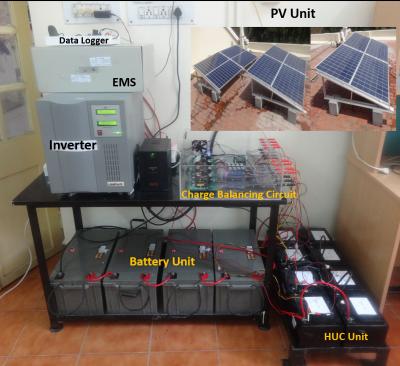An international collaboration led by Swansea University called SUNRISE project was launched to accelerate the commercialization and deployment of low-cost third generation solar energy technology. Initially formed in 2018 between five UK and five top-tier Indian institutions, the project now includes a range of academic and industrial partners from around the world. In 2019, the project also received £800,000 by the UK government to support its activity.
 The team has installed a solar-powered, hybrid ultra-capacitor (HUC) energy storage system in two different village schools in India. Image from The Engineer
The team has installed a solar-powered, hybrid ultra-capacitor (HUC) energy storage system in two different village schools in India. Image from The Engineer
With uptake of solar technology in the developing world hampered by the relatively high installation and maintenance costs of traditional silicon-based solar panels, SUNRISE is focusing its efforts on perovskite solar cells (PSC) which are based on low-cost, earth-abundant, sustainable materials and are thought offer a more affordable solution.
After just two years, the team has grown to a total of 15 academic partners and published over 50 research papers. It has held six biannual symposia of around 80 delegates each, and has continued pushing forward in the face of the pandemic.
On top of all of this, the group has already reported major progress on several key technology demonstrators.
For instance, one consortium partner, IISc Bangalore, has developed a solar-powered, hybrid ultra-capacitor (HUC) energy storage system ideal for use in rural micro-grids, and installed the technology in two different village schools in India that were struggling with an intermittent power supply to their classrooms and computer labs.
The system enables power to be generated from the sun, then stored and distributed as and when needed, providing a reliable and sustainable supply of electricity.
The team is also on target to complete the construction ' again in rural India ' of two modular solar demonstrator buildings featuring integrated perovskite solar cells.
Based on concepts developed at Swansea University's SPECIFIC energy innovation center, the first of these 'OASIS' (Operationally Advanced Structure Integrated Solution) Technology Building Demonstrators ' which is being developed in collaboration with the Tata Institute of Social Sciences and Tata Cleantech Capital Corporate Social Responsibility ' is expected to be completed by March 2021.
A further working stream ' Textiles to Terawatts ' is collaborating with researchers from Mexico's CINVESTAV-Merida research institute, as well as members of the Mexican screen-printed textiles supply chain, to explore the challenges of scaling up low-cost screen-printed solar cell technology from the laboratory.
Throughout the project's life so far, collaboration between different organizations from different countries has been key to translating cutting-edge technology from the laboratory to produce real-world solutions. 'The achievements of the SUNRISE project would not have been possible without our international partners,' said program director Dr. Adrian Walters. 'Being able to draw on expertise from academia and industry in India, Mexico, Kazakhstan, South Africa, as well as the UK has maximized the reach of our impact.'
One of the key elements of this collaborative process is the way it has involved different disciplines, in particular members of the social science community, whose input has been key to ensuring that the end-user communities are engaged with the project. An example of this is the establishment of a community engagement working group consisting of members from physical and social science backgrounds from the UK and India, to raise awareness of the benefits of transdisciplinary working and to ensure community involvement remained a priority.
Partners include: Swansea University; Indian Institute of Science Education and Research, Pune; Imperial College London; Brunel University London, Indian Institute of Science, Bangalore; Jawaharlal Nehru Centre for Advanced Scientific Research, Bangalore; University of Oxford; University of Cambridge; London South Bank University; Indian Institute of Technology, Delhi; Indian Institute of Technology, Kanpur; Indian Institute of Technology, Bombay; CINVESTAV Unidad, Mérida; University of KwaZulu-Natal, South Africa; Institute of Physics and Technology, Kazakhstan.

